“It is impossible to escape the drumbeat of grim news about Alzheimer’s Disease: this it is incurable and largely untreatable, that there is no reliable way to prevent it, and that the disease has for decades beaten the world’s best neuroscientists.”
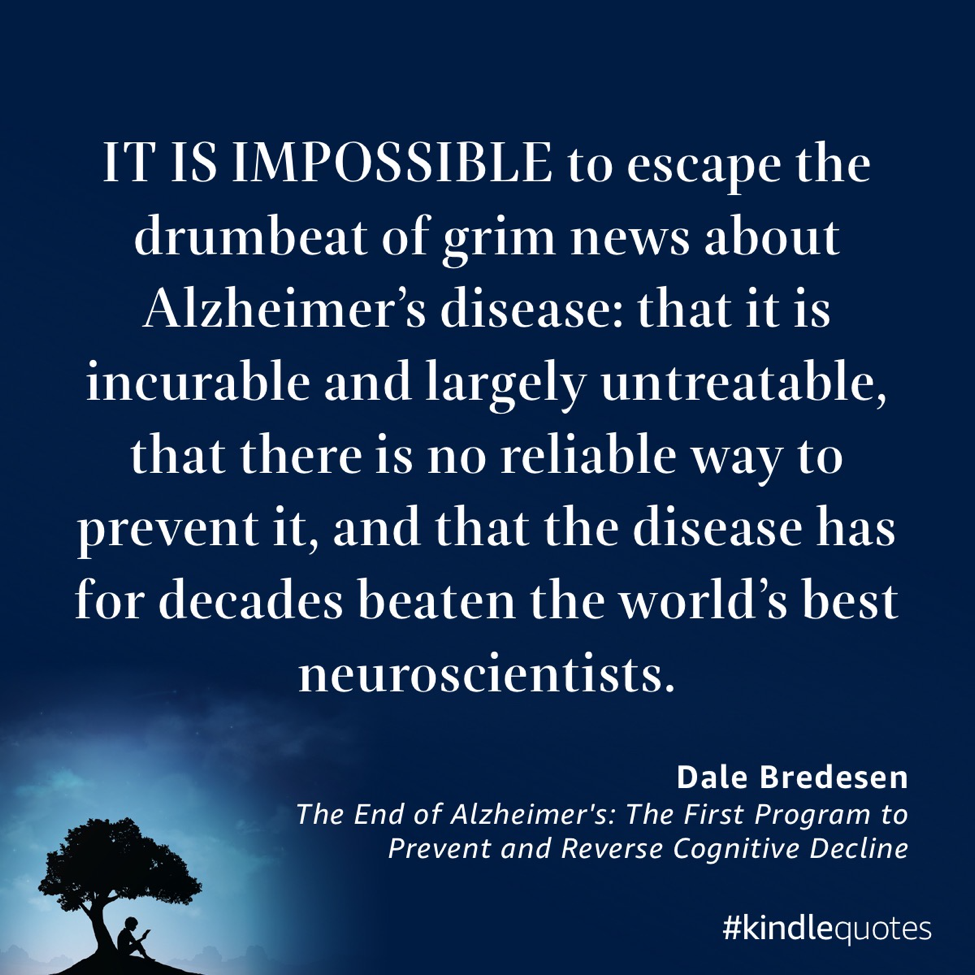
This is an excerpt from Dr. Dale Bredesen’s book, The End of Alzheimer’s: The First Program to Prevent and Reverse Cognitive Decline.
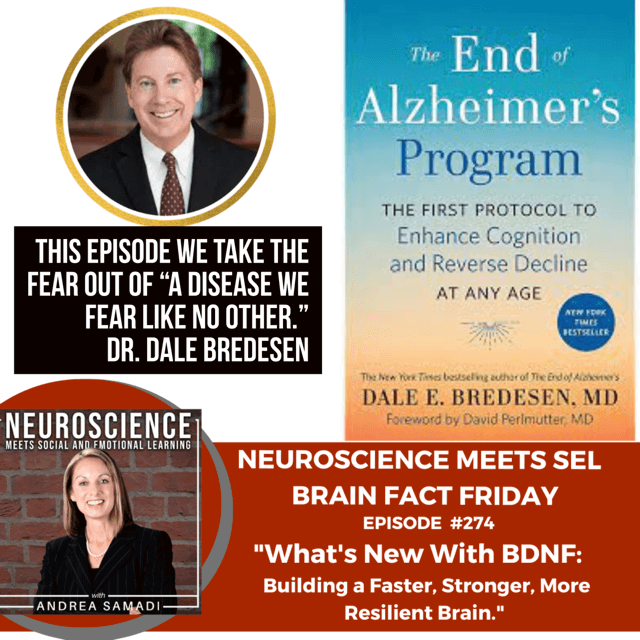
On today’s Episode #274 we will cover
✔ A review of EPISODE #114 where we covered a thorough overview of BDNF (Brain-Derived Neurotrophic Factor) and what we should all understand about this protein and its benefits to the brain.
✔How BDNF is reduced in the brain of someone who has developed Alzheimer's Disease.
✔A look at an internationally recognized expert in the mechanisms of degenerative disease, Dr. Dale Bredesen and his book The End of Alzheimer's to take the "fear" out of this disease.
✔ A look back to the Top 5 Health Staples we created after watching Dr. David Perlmutter's Alzheimer's The Science of Prevention Documentary.
✔ An overview of Dr. Dale Bredesen's Protocol where he is seeing significant results with his patients who shows signs of cognitive impairment.
✔A plan for us to think about the prevention of this debilitating disease.
If American Psychiatrist and brain disorder specialist, Dr. Daniel Amen says that “Alzheimer’s is a lifestyle disease”[i] and innovator in medicine, Dr. Dale Bredesen, with over 30 patents in his name, comes up with a protocol to prevent and reverse cognitive decline, you’d better believe I’m going to feature these important findings in the field of neuroscience on this podcast. If I see anything that could possibly change the course of our lives, improving it in any way, I’ll share what I’m learning with you here on The Neuroscience Meets Social and Emotional Learning Podcast. It’s here where we bridge the gap between theory and practice, with strategies, tools and ideas we can all use immediately, applied to the most current brain research with the goal of heightening productivity in our schools, sports environments and modern workplaces. For returning guests, welcome back, and for those who are new listeners, I’m Andrea Samadi and launched this podcast almost 4 years ago, to share how important an understanding of our brain is for our everyday life and results.
This season (Season 9) we will be focused on Neuroscience: Going Back to the Basics as we revisit our past Brain Fact Fridays, narrowing in on how anything new from the field of neuroscience (that I’ve seen since releasing those earlier episodes) can be tied to improving our productivity, our results, or our mental and physical health. My hopes are that this review will help us to become better prepared to move forward, with a healthier, stronger version of ourselves, as we move towards our goals, or whatever it is that we are working on this year, with this strong foundation and understanding of our brain in place.
This week, we will look back to our third Brain Fact Friday and episode #114 [ii] on “Building a Faster, Stronger, More Resilient Brain by Understanding Brain Derived Neurotrophic Factor or BDNF.” My goal with this episode is that if anyone asks you “what do you know about Brain Derived Neurotrophic Factor” that you would have a clear answer with what we covered on this past episode, (what it is, why it’s important for us to know about) and anything new that we will uncover today that will act as a check for us to see if we really are building a faster, stronger and more resilient brain.
On our last episode we covered:
✔What BDNF (brain-derived neurotrophic factor) is and what are its benefits to the brain.
✔What we should all understand about BDNF with Alzheimer's Disease, Parkinson's Disease and how our brain learns.
✔The Connection Between Exercise, Nutrition and BDNF
✔ Why Putting the Body Under Stress is a Good Thing.
✔Sleep, Stress and the BDNF Factor.
If you want to revisit this past episode, you can click on the link in the show notes, and review the basics of BDNF, a protein that’s found in the brain and other parts of the body “involved in plastic changes related to learning and memory[iii] and higher-level cognitive abilities. This signaling protein is the reason why we can sit at our desk with a heightened sense of focus and concentration, after we exercise. It’s what Dr. Ratey from EPISODE #116[iv] on The Revolutionary New Science of Exercise and the Brain taught us when he said that “movement places demands on the brain, just as it does on muscle, and so the brain releases BDNF which triggers the growth of cells to meet the increased mental demands of movement”[v] and the whole brain benefits from this movement.
ON THIS PAST EPISODE, WE LEARNED THE BENEFITS OF BDNF
- BDNF helps with learning, memory, or other higher-level thinking.
- It grows new neurons and synapses in the brain while also supporting the survival of existing neurons.
- It increases neurogenesis (the process by which new neurons are formed in the brain) and can help to heal our brain after a traumatic brain injury.[vi]
WHAT WE SHOULD KNOW AND UNDERSTAND ABOUT BDNF ESPECIALLY AS IT RELATES TO ALZHEIMER’S DISEASE?
- BDNF is reduced in the brain of someone who has developed Alzheimer’s Disease[vii] and Parkinson’s Disease[viii] and explains why someone with Alzheimer’s has their memory weakened.
Now that we have reviewed what we learned from March 2021, I wonder what else there is about this protein found in the brain and spinal cord that promotes the survival of nerve cells (neurons) that could help all of us with our overall health and well-being and I found something important since that first episode 2 years ago. For today’s episode, #274, we will be looking at the work of Dr. Dale Bredesen, to see if we can take our health and wellness to new heights.
The goal of this episode is to take the “fear” out of Alzheimer’s Disease, as we gain some understanding about it. While there is no known cure for Alzheimer’s Disease, I want to share with you what Dr. Dale Bredesen has discovered, as “the first person to reverse Alzheimer’s Disease in people, not just with experiments with mice in the lab.”[ix]
About Dr. Dale Bredesen
I first came across his work on Dr. Perlmutter’s Alzheimer’s The Science of Prevention Documentary that we covered when our podcast took a turn towards health and wellness in 2020. After this documentary, we created our Top 5 Health Staples with tips for how they can prevent Alzheimer’s Disease and featured these tips on EPISODE #87.[x] While health and wellness have always been important to me on a person level, this episode opened up many doors for me when I was asked to speak on the topic of health and wellness after this episode. I’m not an expert here, (my schooling began in the field of education) but I do take all of these Top 5 health staples seriously, enough to spend any free time I have researching how we can all improve our health and wellness, and share what I’m learning with you here on the podcast.
I do believe that when you walk your talk, and believe in whatever it is that you are doing, that this curiosity for improvement become contagious, especially if whatever it is you are doing is yielding results. Who wouldn’t want to know what’s working for others, and see how they can apply it to their own life? I’ve asked health experts over the years on this podcast, what they think is missing from my list of health staples, and the one thing they’ve said, if I can recall my conversation with Dr. Brian Stenzler, from EPISODE #178[xi] on “Dream Wellness: Taking Your Mental and Physical Health to New Heights” is to include something about reducing stress.
REVIEW of the TOP 5 HEALTH STAPLES
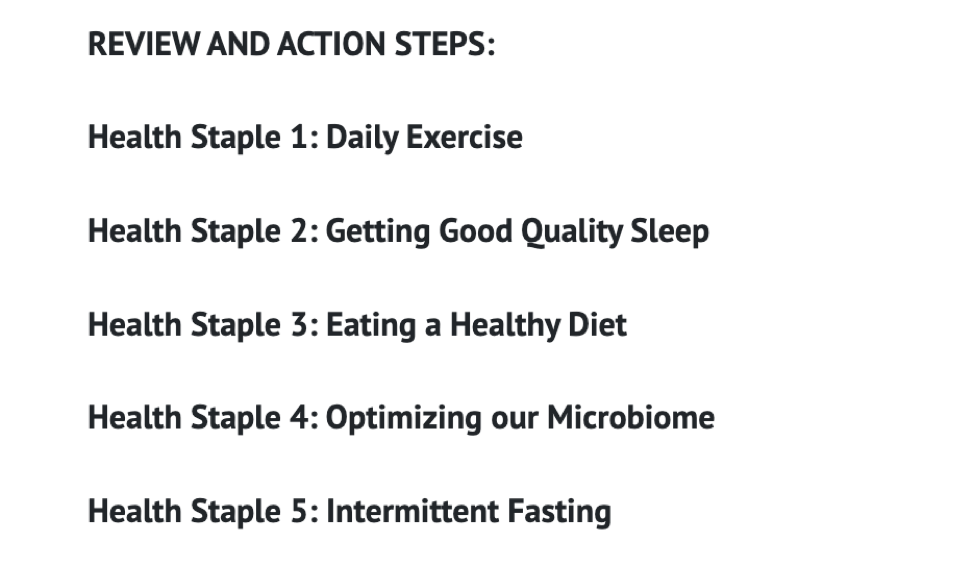
I highly recommend that everyone picks up Dr. Bredesen’s book, The End of Alzheimer’s as he has created a pro-active approach to this disease that we “fear like no other disease.” (Dr. Bredesen).
Dr. Bredesen, an internationally recognized expert in the mechanisms of neurodegenerative diseases, has been guided by a simple idea in his career: that Alzheimer’s as we know it is not just preventable, but reversible. His dedicated pursuit of the science that makes this a reality has placed him at the vanguard of neurological research and led to the discoveries that define his Protocol™ that you will see throughout the pages of his book.
Instead of the old-fashioned, outdated approach to health and wellness, where we wait for symptoms to occur, and then we go to the doctor where we will be told “there’s no known cure for this, but here’s a drug you can take that may or may not provide relief of the symptoms you are having” why not think like Dr. Daniel Amen, (that this is a lifestyle disease) and Dr. Bredesen, that this disease is preventable (for those don’t currently have symptoms) and reversible (if you do). If you follow Dr. Bredesen’s work, you will see he is a humble man, who has seen this eye-opening improvement in his patients over the years, who followed his “Bredesen 7 Protocol.” He said that in his most recent study, that “84% of his participants who were in Phase 3 of having symptoms (showing mild cognitive impairment-or people who had symptoms that were quite far along) that things improved significantly with his protocol.”[xii]
WHAT IS THE BREDESEN 7?
Dr. Bredesen believes that Alzheimer’s is a “network insufficiency” that occurs when parts of our brain are not functioning optimally. He says we need “Mitochondrial function (the energy powerhouse in our cells), growth factor support, BDNF, (the focus of this episode) blood flow, oxygen and ketone levels”[xiii] and if you look at the diagram in the show notes, his health staples, or his trademarked protocol include nutrition, exercise, sleep, stress reduction, brain stimulation, detoxing the body, and supplements. You can read more about the importance of each of these 7 protocols on his website.
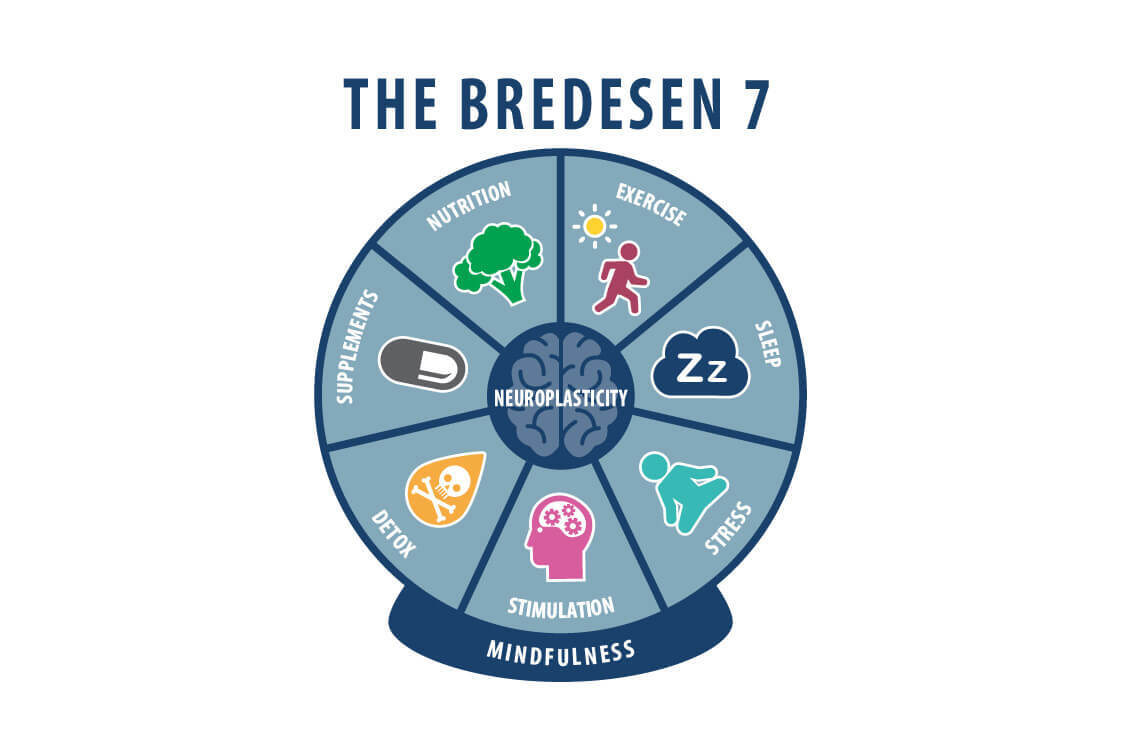
For today’s episode, my hope was that if at any given time, if we are asked “what are you doing for YOUR cognitive health?” that we all have a thorough answer, using our deep and thorough understanding of this protein, BDNF that:
- BDNF helps with learning, memory, or other higher-level thinking.
- It grows new neurons and synapses in the brain while also supporting the survival of existing neurons.
- It increases neurogenesis (the process by which new neurons are formed in the brain) and can help to heal our brain after a traumatic brain injury.
- BDNF is reduced in the brain of someone who has developed Alzheimer’s Disease[xiv] and Parkinson’s Disease[xv] and explains why someone with Alzheimer’s has their memory weakened.
Since this disease is preventable, I wanted us to think about this. Here’s a passionate and heartfelt excerpt from The End of Alzheimer’s:
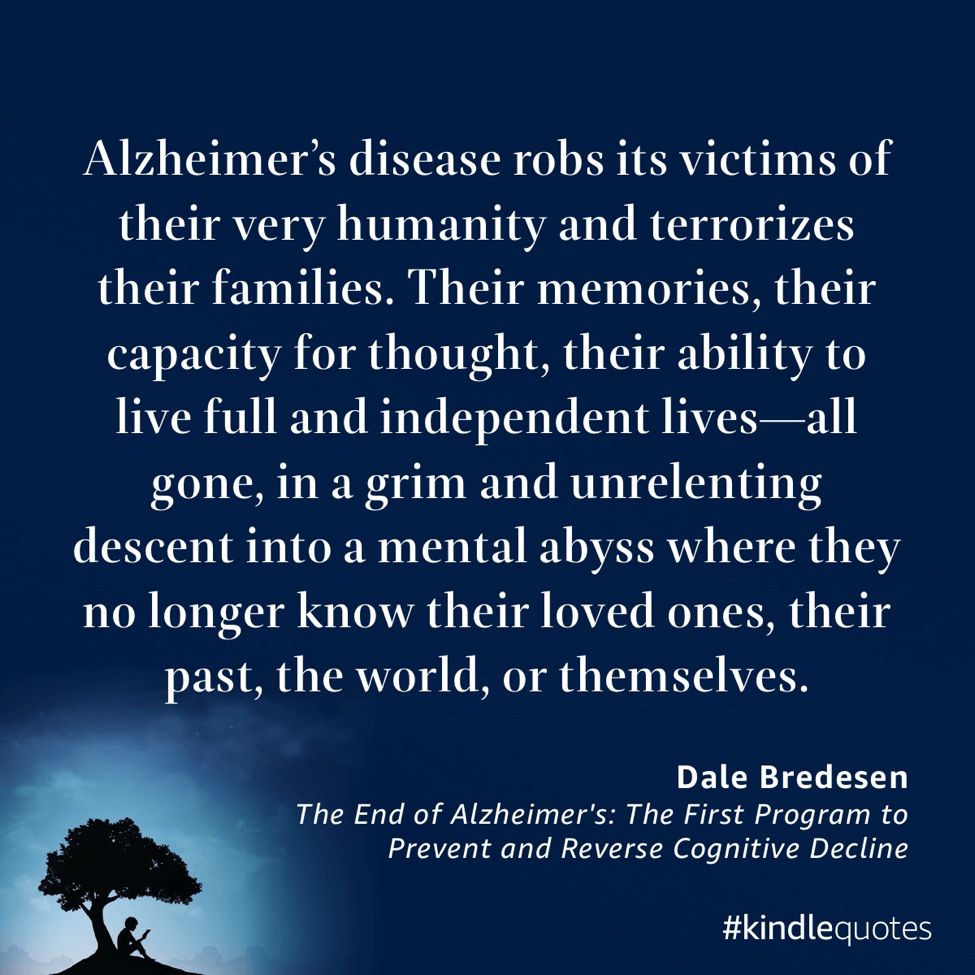
If anyone has seen this first hand, Dr. Bredesen’s description of this disease will resonate as very true.
REVIEW AND CONCLUSION
So now that we know that BDNF is reduced in someone with Alzheimer’s Disease, and we’ve seen Dr. Bredesen’s work where he’s been able to prevent AND reverse cognitive decline in those who have come to see him, I think that understanding our TOP HEALTH STAPLES with our brain in mind should include a clear understanding of what BDNF is, and why it’s important for our mental and physical health as we age.
Dr. Bredesen gives a good analogy of our brain to a computer, that over time begins to slow down in performance when it runs out of space. Like a computer, we can keep our brain healthy, by doing what we can to prevent this debilitating disease, and like Dr. Daniel Amen said, “it’s a lifestyle disease.” By no means is this episode here to say that these tips will cure you if you’ve noticed cognitive decline in yourself, or someone else, the point of this episode is to direct us all to what we can do today to build a stronger, healthier and more resilient brain, even as we age.
We can all tell when our brain isn’t as sharp as it used to be. I noticed it very clearly while interviewing guests on this podcast. It takes a very clear mind to be able to recall details of past episodes, or book names, or what the book was about, or even the person’s name that I’m speaking with. Every detail matters, and when I noticed a lack of clarity this past summer, I knew it was time to tighten up my own health protocol and take things to a new level.
What about you?
- What have you noticed with your ability to think clearly, or recall information on a daily basis?
- If you look at the Bredesen 7 Protocol can you see areas you would like to improve?
- We don’t need to change everything all at once, one small step at a time can make a huge difference, but the first step, I think is to take a solid inventory of ourselves, and notice if something needs to change.
To conclude this week’s Brain Fact Friday, on our review of BDNF, my suggestion is that we all take note in ways that we can increase BDNF.
PUTTING THE BREDESEN 7 INTO PRACTICE FOR IMPROVED COGNITION:
Dr. Dale Bredesen, who was the first person to reverse Alzheimer’s in humans (not just mice) has come up with his “Bredesen 7” that includes strategies similar to the Top 5 health staples we’ve been covering on this podcast the past few years.
I’ll leave you with some final thoughts of where to begin. Look at the diagram in the show notes, and think:
- Are there areas here that you can improve?
- If your life depended on it, would that be enough to motivate you to try something new?
- Pick one area that you will work on and create a plan to SHIFT this one area.
If it’s nutrition, what can you do to support your cognitive health with the food you are eating? For exercise, what can you do to move more every day? I just read the other day that “sitting is the new smoking”[xvi] and that over 25% of American adults site for more than eight hours every day, with 44% of these people getting little or no exercise. How are you reducing stress? I use exercise and meditation as ways to reduce stress. Sleep is always something I’m personally working on improving, and so far, I’ve not mastered this one yet, unless I’m on vacation. For mental stimulation, one of the reasons I don’t ever plan on giving up on this podcast, even when time is more limited, is for the fact that I know writing and recording these episodes keeps my brain mentally active. One area that surprised me while researching over the years was with the detox section, and it’s not just about be careful what you put into your body, but also thinking about our oral health. Brushing our teeth and flossing is actually good for our brain. I learned this one from Dr. Daniel Amen[xvii] who is the first to share how proud he is with his excellent oral hygiene. Supplements are another interesting area to pay attention to, and while I do take certain ones every day, this is something that would be individual to everyone’s needs. I’ll put a link to a recent podcast episode from Dr. Andrew Huberman that he did on a Deep Dive into Supplements, what to take and why.[xviii]
I hope this episode has made you think about your brain in a new light. Like our computer needs the right amount of memory to work properly, so does our body, that’s driven by our brain, and the hope that I’d like to provide is that it’s not too late for any of us to make changes if you’ve gone off track, and notice your memory is not as sharp as it used to be. I made some very small and simple shifts last summer that yielded huge results, and know it just takes the will to find a new and improved way.
And with that, we’ll close out today’s episode, and will see you next week as we revisit one of my all-time favorite episodes on “The Damaging Impacts of Sugar on the Brain and Body.”[xix] This next one is going to be good!
See you next week.
FOLLOW ANDREA SAMADI:
YouTube Channel: https://www.youtube.com/c/AndreaSamadi
Website https://www.achieveit360.com/
LinkedIn: https://www.linkedin.com/in/samadi/
Facebook: https://www.facebook.com/Achieveit360com
Neuroscience Meets SEL Facebook Group https://www.facebook.com/groups/2975814899101697
Twitter: https://twitter.com/andreasamadi
Instagram: https://www.instagram.com/andreasamadi/
RESOURCES:
The Bredesen 7 Protocol https://www.apollohealthco.com/simplifying-the-bredesen-protocol/
REFERENCES:
[i] Alzheimer’s is a Lifestyle Disease by Dr. Daniel Amen Published Nov. 3, 2021 https://www.amenclinics.com/blog/alzheimers-is-a-lifestyle-disease/
[ii]Neuroscience Meets Social and Emotional Learning Podcast EPISODE #114 on “Building a Faster, Stronger, More Resilient Brain by Understanding Brain Derived Neurotrophic Factor or BDNF” https://andreasamadi.podbean.com/e/brain-fact-friday-on-building-a-faster-stronger-resilient-brain-by-understanding-brain-derived-neurotrophic-factor-bdnf/
[iii] Brain Derived Neurotrophic Factor: A Key Molecule for Memory in the Healthy and Pathological Brain (August 07, 2019) by Magdalena Miranda, Juan Facundo Morici, Maria Belen Zanoni, and Pedro Bekinschtein https://www.frontiersin.org/articles/10.3389/fncel.2019.00363/full
[iv]Neuroscience Meets Social and Emotional Learning Podcast EPISODE#116 with Dr. John Ratey on “The Revolutionary New Science of Exercise and the Brain” https://andreasamadi.podbean.com/e/best-selling-author-john-j-ratey-md-on-the-revolutionary-new-science-of-exercise-and-the-brain/
[v] Brain Derived Neurotrophic Factor: A Key Molecule for Memory in the Healthy and Pathological Brain (August 07, 2019) by Magdalena Miranda, Juan Facundo Morici, Maria Belen Zanoni, and Pedro Bekinschtein https://www.frontiersin.org/articles/10.3389/fncel.2019.00363/full
[vi] Therapeutic potential of BDNF Published Jan. 2017 by Mary Wurzelmann, Jennifer Romeika, Dong Sun https://pubmed.ncbi.nlm.nih.gov/28250730/
[vii] BDNF ameliorates learning deficits in a rat model of Alzheimer’s https://pubmed.ncbi.nlm.nih.gov/25849905/
[viii] Relationship of circulatory BDNF with cognitive deficits in people with Parkinson’s disease https://pubmed.ncbi.nlm.nih.gov/26944151/
[ix] Peggy Sarlin’s Brain Health Breakthroughs, Awakening from Alzheimer’s https://brainhealthbreakthroughs.com/registered/
[x]Neuroscience Meets Social and Emotional Learning Podcast EPISODE #87 on “The Top 5 Brain Health and Alzheimer’s Prevention Strategies” https://andreasamadi.podbean.com/e/do-you-know-the-top-5-brain-health-and-alzheimers-prevention-strategies-with-andrea-samadi/
[xi] Neuroscience Meets Social and Emotional Learning Podcast EPISODE #178 with Dr. Brian Stenzler on“Dream Wellness: Taking Your Mental and Physical Health to New Heights” https://andreasamadi.podbean.com/e/dr-brian-stenzler-on-dream-wellness-taking-your-mental-and-physical-health-to-new-heights/
[xii] Peggy Sarlin’s Brain Health Breakthroughs, Awakening from Alzheimer’s https://brainhealthbreakthroughs.com/registered/
[xiii] IBID
[xiv] BDNF ameliorates learning deficits in a rat model of Alzheimer’s https://pubmed.ncbi.nlm.nih.gov/25849905/
[xv] Relationship of circulatory BDNF with cognitive deficits in people with Parkinson’s disease https://pubmed.ncbi.nlm.nih.gov/26944151/
[xvi] Sitting is the New Smoking by Hannah, August 10, 2019 https://theheartfoundation.org/2019/08/10/is-sitting-the-new-smoking/
[xvii] Here’s Why Flossing is So Important For Your Health by Keith Rowe for Dr. Amen’s Brain MD https://brainmd.com/blog/benefits-of-flossing-for-gum-health/
[xviii] Dr. Andrew Huberman Supplements: Full List, Deep Dive into What and Why https://fastlifehacks.com/andrew-huberman-supplements-list/
[xix]Neuroscience Meets Social and Emotional Learning Podcast EPISODE #117 on “The Damaging Impact of Sugar on the Brain and Body” https://andreasamadi.podbean.com/e/brain-fact-friday-on-the-damaging-impact-of-sugar-on-the-brain-and-body-with-andrea-samadi/
No comments yet. Be the first to say something!